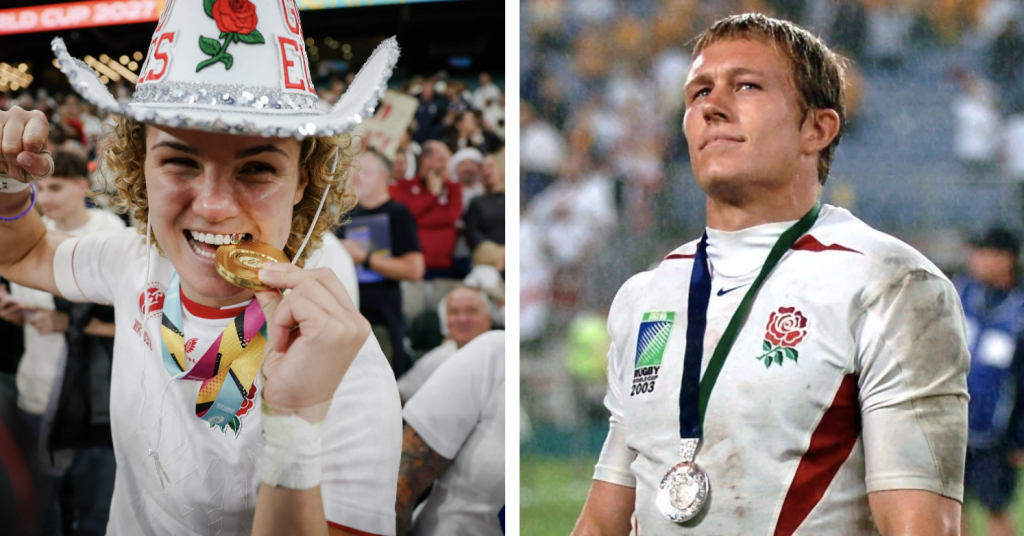8 Rory Underwood
Speed defined Rory Underwood’s career, making him England’s most prolific men’s try scorer. Between 1984 and 1996, he ran in 49 tries in 85 internationals, a record that still stands today. A stalwart of Leicester Tigers, where he played over 230 matches, Underwood was the ultimate finisher — able to turn space into points in an instant. His consistency and dazzling acceleration made him one of rugby’s most feared wingers and a legend of the English game.
7 Sarah Hunter
Leadership, resilience, and an unwavering commitment to her team made Sarah Hunter the heartbeat of the Red Roses for more than a decade. Playing at number eight, she captained England through four World Cups, lifting the trophy in 2014 and earning a reputation as one of the most respected leaders in rugby. In 2021, she surpassed Rochelle Clark to become England’s most-capped player, with 138 appearances. Her legacy is not just in silverware but in her inspiration to teammates and the wider women’s game.
6 Jason Robinson
Few players thrilled crowds like Jason Robinson, whose explosive pace and sidestep struck fear into defenders. After switching codes from rugby league, he quickly became a sensation in union, winning 51 England caps and scoring in the 2003 World Cup final. Robinson also represented the British & Irish Lions, where his speed and agility lit up test matches. As the first black man to captain England, he broke new ground, leaving a legacy of both sporting brilliance and cultural significance.
5 Richard Hill
Richard Hill provided the unglamorous but vital work that underpinned England’s successes. His defensive organisation, relentless tackling, and tactical awareness made him indispensable during the 2003 World Cup campaign. Though not always in the spotlight, Hill’s consistency and reliability earned him huge respect among teammates and coaches, securing his place as one of England’s most influential flankers.
4 Jason Leonard
Durability and dominance defined Jason Leonard’s extraordinary career, during which he became one of the most-capped players in rugby history. He played in four Grand Slam-winning England teams and was a key part of the 2003 World Cup triumph.
Leonard also toured three times with the British & Irish Lions, winning five test caps. His contributions were recognised with an MBE, OBE, and induction into the World Rugby Hall of Fame, confirming his status as one of the game’s greatest props.
3 Lawrence Dallaglio
Charisma, power, and versatility made Lawrence Dallaglio one of England’s most iconic forwards. Able to play across the back row, he collected 85 caps and was a key figure in England’s 2003 World Cup win.His influence extended beyond the XVs game — he is one of the few players to hold both Rugby World Cup and Sevens World Cup titles. Three Lions tours added further weight to his legacy, cementing Dallaglio’s reputation as a true leader on and off the field.
2 Martin Johnson
Few captains in rugby history have commanded respect like Martin Johnson. Towering in both stature and authority, he led England to their 2003 World Cup triumph, embodying discipline, strength, and sheer determination. Revered as one of the greatest locks to play the game, Johnson also captained the British & Irish Lions, enhancing his legendary status. His leadership qualities continue to inspire, making him a benchmark for what it means to lead in rugby.
1 Jonny Wilkinson
Precision, resilience, and unrelenting dedication defined Jonny Wilkinson’s career, culminating in his iconic drop goal that secured England’s 2003 World Cup victory.
A perfectionist in training and a match-winner under pressure, Wilkinson played 12 years with Newcastle before enjoying European success at Toulon. His extraordinary point-scoring feats and unwavering humility made him one of rugby’s most admired figures.
Today, he is remembered not only as one of the greatest fly-halves of all time, but as a player who redefined professionalism in the sport.
Like this:
Like Loading…

